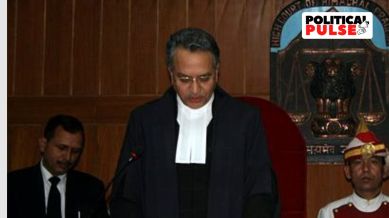Meet the new ‘Lokpal of India’: Justice A M Khanwilkar, who penned several orders key for Modi govt
Shortlisted for post vacant since nearly 2 years, as SC judge, Justice Khanwilkar was part of orders decriminalising homosexuality, clearing strict provisions of PMLA and FCRA, and upholding SIT clean chit to Gujarat govt for 2002 riots.

After a gap of nearly two years, the new chairperson of the Lokpal, former Supreme Court Justice AM Khanwilkar, has been appointed on Tuesday. The appointment came two weeks after the selection committee shortlisted his name.
Khanwilkar, 66, is only be the second chairperson of the Lokpal, known as the ‘Lokpal of India’. The first chairperson was former Supreme Court Justice Pinaki Chandra Ghose, who held the office from March 2019 and retired in May 2022. Former Jharkhand High Court Chief Justice Pradip Kumar Mohanty has been the Acting Chairperson since.
Appointed as a judge of the Bombay High Court in March 2000, Khanwilkar served as Chief Justice of the Himachal Pradesh High Court and Madhya Pradesh High Court, before being elevated to the Supreme Court.
Soon after, he was a part of the majority ruling in the five-judge Bench that decided to decriminalise homosexuality. In 2018, he was part of another Constitution Bench decision, in which the Court held that the right to die with dignity formed an integral part of the right to life and liberty under Article 21, thus legalising passive euthanasia for patients with terminal illnesses.
In September 2018, Justice Khanwilkar was part of the five-judge Constitution Benches in the landmark Aadhaar and Sabarimala cases. While the Court upheld the constitutional validity of Aadhaar, in the Sabarimala case, by 4:1 majority, it expanded the right to equality, allowing girls and women of all ages to visit the Sabarimala temple in Kerala.
In 2020, Justice Khanwilkar authored the decision to uphold the Foreign Contribution (Regulation) Amendment Act, 2020. The amended Act had a drastic effect on the functioning of NGOs and other organisations by placing stringent restrictions on how foreign funds could be utilised.
In 2021, he authored the three-judge Bench judgment establishing the protocol that state governments must follow before reserving seats in local bodies. As per the conditions, governments must first set up a committee to study the backwardness of different communities, specify the proportion of reservation, and ensure that the total reservation does not exceed 50%.
In June 2022, Khanwilkar was part of the bench that upheld the SIT clean chit to Modi and others in the 2002 riots case, which had been challenged by Zakia Jafri. The Supreme Court held that Jafri, whose husband Ahsan Jafri was killed in the riots, had pursued the proceedings to “keep the pot boiling, obviously, for ulterior design” and said “all those involved in such abuse of process, need to be in the dock”. The next day, the Gujarat Police had arrested activist Teesta Setalvad and former IPS officer on charges of fabricating evidence linked to the riots.
A month later, on July 27, 2022, two days before his retirement, Justice Khanwilkar delivered the judgment upholding the constitutionality of the PMLA, 2002, granting wide investigative powers to the Enforcement Directorate, doing away with the “presumption of innocence” for accused persons, and providing restrictive conditions for anyone seeking bail under this Act.
As a judge of the Supreme Court, Justice Khanwilkar wrote 226 judgments – only three judges wrote more – and was a part of 817 Benches, as per data collected by the Supreme Court Observer. While he authored judgments on a range of subjects, he most frequently wrote on criminal, civil and constitutional matters.
At the time of his retirement, then Chief Justice N V Ramana called Khanwilkar a “hard-working and disciplined judge” and “a strong proponent for the use of technology” in the judiciary.
Before he became a judge, Khanwilkar worked as a lawyer, enrolling as an advocate in 1982 and practising exclusively in the Supreme Court from 1984 onwards. He represented the State of Maharashtra, his home state, first as a Standing Counsel and then as an Additional Government Advocate. He also served as the Standing Counsel for the Election Commission of India.
During his 18 years as an advocate, he assisted the apex court in a variety of matters. In the landmark M C Mehta v Union of India (1996) case, in which the court tackled the pollution of the Ganga river due to effluents from surrounding tanneries, Khanwilkar was appointed as amicus curiae to assist the court on environmental issues
The Lokpal, which possesses the powers to investigate, prosecute and occasionally constitute benches to hear cases of corruption against public officials connected with the Central government, was established following the enactment of the Lokpal and Lokayuktas Act, 2013. The Act was brought in by the UPA government after a campaign against corruption led by India Against Corruption, including Anna Hazare.
The chairperson is appointed by a committee comprising the Prime Minister, Leader of the Opposition, the Speaker of the house, the Chief Justice of India and one “eminent jurist” nominated by the President.